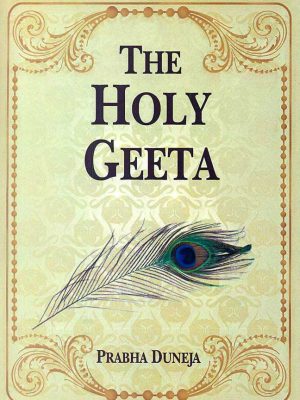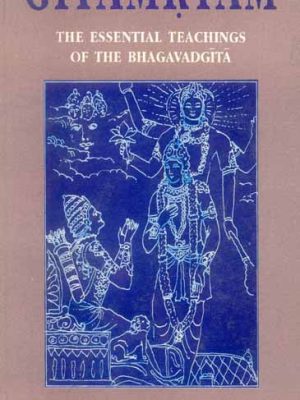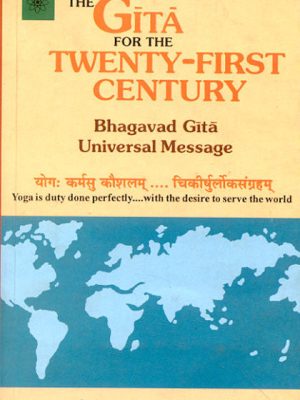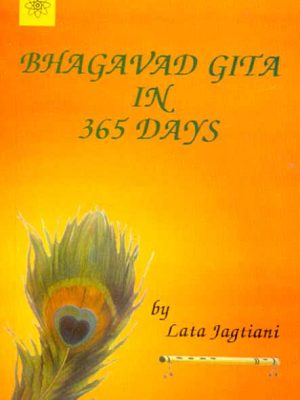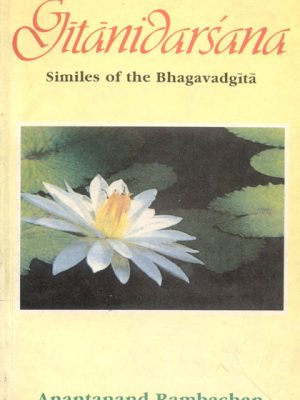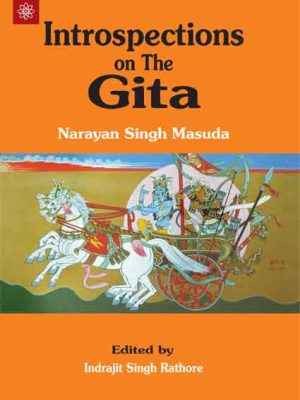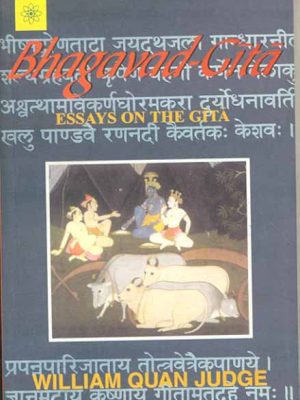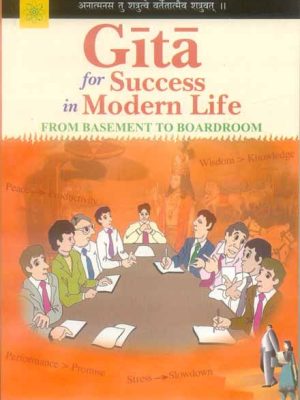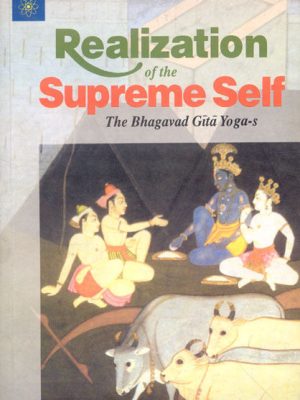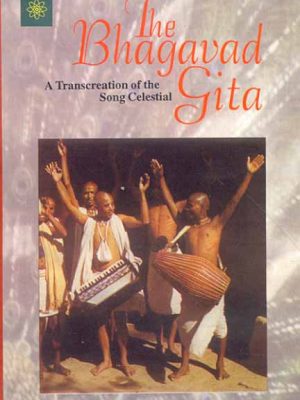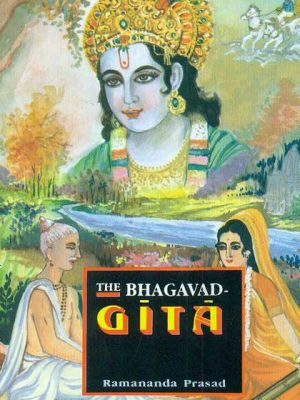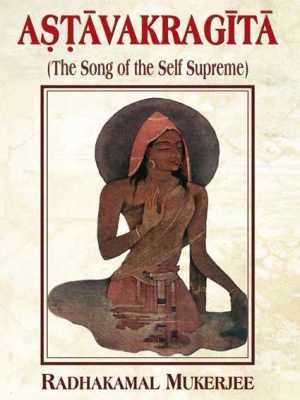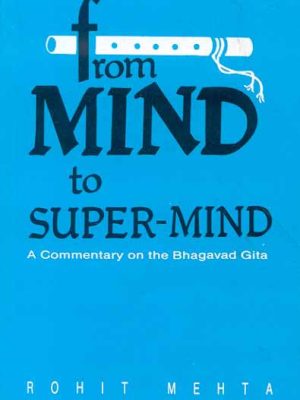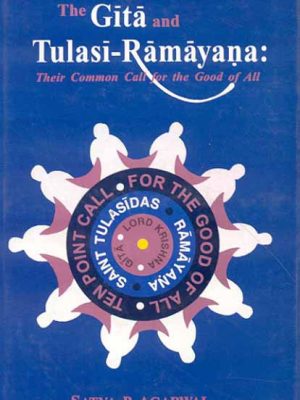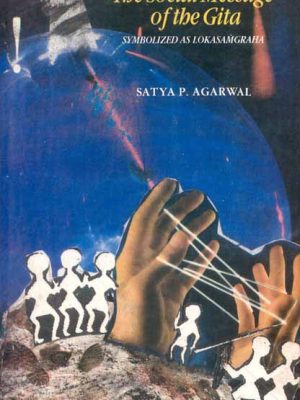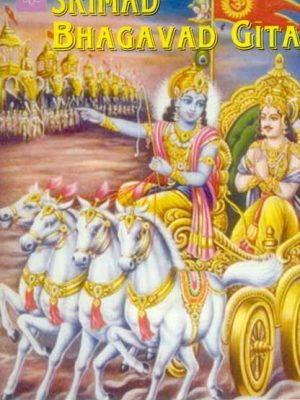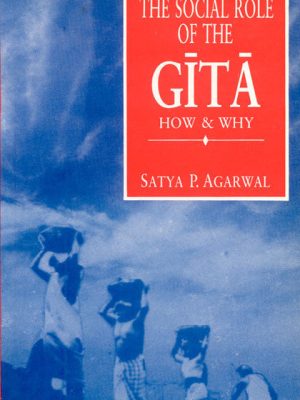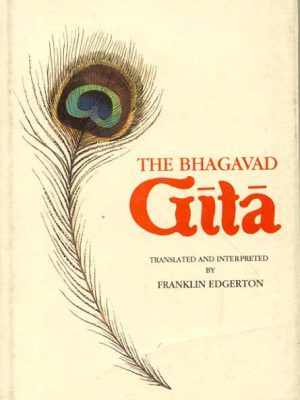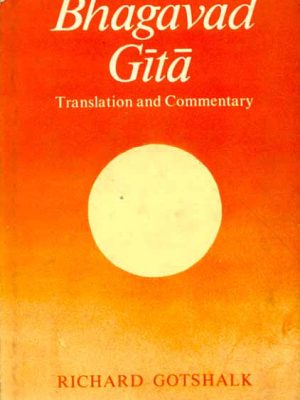Bhagavad Gita
-
The Holy Geeta: Srimad Bhagawad Geeta, Sanskrit and Romanized Text with English Translation
The message of the holy dialogue between Lord Krishna and Arjuna in the Bhishma Parvan episode of Mahabharata has been held in deep reverence by the sages, philosophers and the learned scholars all over the world. The teachings of Geeta are universal and meant for the welfare of
entire creation. There are hundreds of commentaries on Bhagawad Geeta both in Indian and in many foreign languages.
In the words of Dr. Radhakrishnan, ‘for centuries people have found comfort in this great book which sets forth in precise and penetrating words the essential principles of a spiritual religion which are not contingent on ill-founded facts, unscientific dogmas or arbitrary fancies.’
The present translation is only a humble addition to the work which has been accomplished
earlier by the Geeta scholars. This translation with Romanized Sanskrit verses has been brought
forward in order to encourage the modern generation into the study of this ancient scripture.
This work is also meant to help the Indians living in foreign countries and to arouse the interest of foreigners into the recitation of Sanskrit verses and to understand the meaning of Geeta in a simple flexible and comprehensible language.
Review(s)
“The Bhagawad Geeta is a first-hand guide to the ancient roots of Vedic religion.” – Dr. R.C. Zeahner
“When doubts haunt me, when disappointments stare me in the face, and I don’t see any ray of hope on the horizon, I turn to The Bhagawad Geeta and find a verse to comfort me.” – Mahatma Gandhi
“The Bhagawad Geeta is perhaps the most systematic spiritual statement of the Perennial Philosophy.”-Aldous Huxley
About the Author(s)
Founder and president of the Geeta Society, is also an active member of the Women’s Federation for world peace and the United Nations Association, USA. She is also the chairwoman of the Women’s Interfaith Circle of Service/CC-URI and a recipient of the Global Citizen award, given by UNA-the Commonwealth Club San Francisco, the Parliament of World’s Religions, schools, universities, churches, mosques, and interfaith conferences.
Mrs. Duneja, a graduate from the Sanskrit University of Kurukshetra, is a well-known Vedic scholar and a devotee of Lord Krishna. She is the author of the Legacy of Yoga in Bhagawad Geeta, Mantra and the Modern Man, Bhagawad Geeta: The Gospel of Timeless Wisdom, and has also recorded several series of lectures on the science of yoga and meditation, the secret powers of mantra, and the Bhagawad Geeta. For more information visit her website: holygeeta.org and contact her at duneja@aol.com
₹100.00 -
Gitamrtam: The Essential Teachings of the Bhagavad Gita
Gitamrtam is a concise and insightful discussion of the central themes of the Bhagavadgita. Beginning with the Gita’s teaching about the nature and role of the incarnation, Dr. Rambachan identifies kama, a state of desiring and wanting, as life’s fundamental problem. The proper resolution of this human dissatisfaction is to be found in the understanding of oneself to be the full and complete self (atman). Such knowledge, Dr. Rambachan vigorously argues, enables one to act in the world from a deep sense of inward peace and fulfilment. Self-knowledge transforms human motivation and liberates us from the narrow confines of selfish action to the freedom of serving others. Dr. Rambachan establishes that the Bhagavadgita ideal is not indifference to the world and the severing of human relationships, but
love and compassion born out of the identity of oneself with all beings. In a lucid and accessible style, Dr. Rambachan shows how the Gita’s teaching makes possible a love which embraces all and infuses each act with compassion.
Review(s)
About the Author(s)
ANANTANAND RAMBACHAN is an Associate Professor of Religion at St. Olaf
College in Minnesota. A native of Trinidad and Tobago, Dr. Rambachan earned
his Ph.D. at the University of Leeds in the United Kingdom. He was awarded
Trinidad’s second highest national honor, the Chaconia Gold Medal, for
public service in 1987.
₹195.00 -
Gita For The Twenty-First Century: Bhagavad Gita Universal Message
This latest version of Bhagavad-Gita (with slokas in Sanskrit and commentary in English) explains how the message of social service has been derived from this universal scripture. Written in a simple style, it will enable common people including high school students) to obtain a clear understanding of the teachings of the Gita so that they can work efficiently for the good of the society (and for their own good too). Keeping in mind the inter-connected nature of the various chapters of the Gita, ample cross-references are given in this book to help the readers identify the main points of this scripture’s basic message. Furthermore, a ten-point summary of this message is also made an integral part of the last chapter, in response to the feedback received from readers who had gone through an earlier draft of this book.
Review(s)
About the Author(s)
Dr. Satya P. Agarwal is a Social Scientist. His academic honours include five gold medals and numerous merit scholarships and research fellowships at various universities. The Governor of the State of Maryland conferred upon him “The Governor’s Citation”, in recognition of his pioneering books as also his contribution to social service. He is author of several books besides the present one which are widely acclaimed and appreciated by the discerning readers. Other honours conferred on him include: (i) Kunti Goyal International Award, (ii) Special Award of Manas Sangam and (iii) International Tulasi Award.
₹195.00 -
Bhagavad Gita in 365 days: The Spiritual Essence of the Gita
Bhagavad Gita in 365 days is a brief and simplified account of the dialogue betwwen a despondent Arjuna and the clear headed sagacious lord Krishna. It extracts the essence of the Gita in an undauting and user friendly format. With skill Lata Jagtiani has condensed the verses while retaining the philosophical essence of the Gita.
A pocket size book handy for travellers it requires a read of only a minute a day time that even the busiest amongst us can spare for a life of peace. A symbolic dip in the Ganges of wisdom it is sure to be an invaluable friend for readers of bothe sexes across all faiths for anybody given to asking philosophical questions.
Review(s)
For city dwellers busy with their daily routines, work qualms and household chores commuting and always on the move; spending some time on religion and mental relaxation is a distant thought. ‘Bhagavad Gita in 365 Days is just the book for such individual
About the Author(s)
₹195.00 -
Gitanidarsana: Similies of the Bhagavad Gita
In the Bhagavad Gita, Krishna employs various teaching methods to aid Arjuna’s comprehension and to remove his misunderstandings. He often explains a difficult statement with the aid of a simile drawn from everyday human experience and the Bhagavad Gita contains some of the most suggestive and beautiful similes in the entire sacred literature of Hinduism. The similes of Krishna add a beautiful visual dimension to words and invite reflection and exploration.
In this text, Prof. Rambachan has chosen twelve similes for reflection. They deal with diverse but interrelated matters such as the nature of the self, death, scriptures, self-control, peace, wisdom, and the nature of God. These similes offer an exciting entrance into the Hindu worldview and the author invites us to explore the inexhaustible richness of each image.
Review(s)
“…Each of the similes contains an inexhaustible richness of meaning to which the author adds significant classification. The similes open up an easy entrance to the basic Hindu thought which otherwise could be elusive for easy comprehension. An inte
About the Author(s)
ANANTANAND RAMBACHAN is an Associate Professor of Religion at St. Olaf
College in Minnesota. A native of Trinidad and Tobago, Dr. Rambachan earned
his Ph.D. at the University of Leeds in the United Kingdom. He was awarded
Trinidad’s second-highest national honor, the Chaconia Gold Medal, for
public service in 1987.
₹225.00 -
Introspections on The Gita
Review(s)
‘an interesting and thought-provoking commentary on the Gita’ – Karan Singh, eminent Indologist, author, champion of interfaith dialogue, Padma Vibhushan.
‘Lucid & Contemplative’ – Namita Gokhale, author of Paro: Dreams of Passion
About the Author(s)
₹225.00Introspections on The Gita
₹225.00 -
Bhagavad Gita: Combined with his Essays on the Gita
The Gita offers a succinct summary of ancient Indian philosophy, with particular emphasis on the Supreme Spirit as both immanent and transcendent. Since its introduction into the Western world some two hundred years ago, the poem has been translated into practically every modern tongue, and is today the most widely read and discussed of all Eastern scriptures. Its emphasis is on two aspects selflessness. Recension of the Gita, combined with illuminating Essays on the poem make the present work unique. It works as a bridge between the Gita’s oriental approach and modern occidental thought.
Review(s)
About the Author(s)
WILLIAM Q. JUDGE, a renowned Theosophist of his time, had profound
knowledge and deep insight into the study of Theosophy. He was the writer
of highly acclaimed ideas that transmit perfectly the wisdom of Theosophy
to the lay readers.
₹250.00 -
Gita For Success In Modern Life: From Basement to Board Room
This book underscores that the Gita is not for abandoning active life but for reconstructing.
The book focuses particularly on the modern man. It does not deal with an imaginary or an ideal situation but with man’s real life. It recognises that man is caught up in a whirlpool of conflicting values and tries to resolve and reconcile them. The book explores various dimensions of man’s life – as an individual, as a family member, as a social being and as a businessman, as well.
The book selects only a few chapters and shlokas and brings out the principal teachings of the Gita which are of direct relevance in the context of contemporary modern life.
Review(s)
“Parables and metaphors in the Gita have been used as in other ancient scritures and literature to explain the subtle meanings in a simple manner to the reader……Separate chapters have been devoted to different ingredients of Karma Yoga……A Pe
About the Author(s)
₹250.00 -
Realization of the Supreme Self: The Bhagavad Gita Yogas
This book presents the Gita yoga in the light of explanations by Sankara.
The Gita can be misread, as Sankara says. It is not a gradual ascent to the
final devotion of the sould to a Lord high above. The whole basis of Gita
yoga is confirmation through experiments. not mere exhortion. This highly
significant book presents the Gita as a training manual for spiritual
practice.
Review(s)
About the Author(s)
₹295.00 -
The Bhagavad Gita: A Transcreation of the song celestial
The Bhagavad Gita is one of the world’s greatest scriptures, the key sacred text of Hinduism. It means the ‘Song of God’ and is often called the ‘Song Celestial’. Alan Jacobs has succeeded in revitalizing the ancient text into a form which reveals the full majesty of the magnificent scriptures as well as its practical message for today’s seekers. The outdated English of Sir Edwin Arnold’s fine poetic translation in 1885 has been trasnsformed and given clear meaning. It has also been expanded to reinforce the poetic imagery using cotemporary free verse based on innovative metaphors. “It is like a great symphony. each chapter relates to the last but leads on to the coda.”
Review(s)
About the Author(s)
₹295.00 -
The Bhagavad-Gita: The Song of God: Original Sanskrit text & Roman Transliteration, A lucid english rendition,
The Gita is a song-not just any song, but a very special song, the song of God-sung by the
Divine Being of infinite consciousness to His most beloved devotee, Arjuna. Arjuna in Sanskrit means clear white light, the brightness and clarity, the name of the man who manifested the clarity of pure devotion by which the Lord’s wisdom may be heard, and by which the universal form may be perceived. And what a song it is! A symphony of soul’s longing for divinity, of the search for clarity, the explanations of yoga-what constitutes divine union, and how one gets there. No
subject of spiritual evolution remains neglected by the Gita.
The Gita has been translated into more languages than any other literary work. In English
alone there are more renditions than can be counted. Each one has its own character, each one
a slightly different analysis. Some are poetic, some philosophical, some dogmatic, some universal.
This translation by Dr. Prasad is just beautiful-so simple and clear. He uses just enough sanskrit to convey the majesty and beauty of the language and the intensity of the dialogue, and yet does not leave the reader dumbfounded in an unintelligible maze of vocabulary. The universal principle of the philosophy he espouses are filled with poetic grace and style. He captures so much of the Grace of the Gita, even in the prose of English, that the orchestrations of wisdom cannot but help lull our hearts after every chapter.
From Confusion’s first desire to neglect one’s duty or responsibilities, to the infinite vision of
the Lord as a consequence of total surrender to the will of God, Prasad’s rendering takes the
reader from doubts and misgivings to perfect efficiency in all that one undertakes.
The Bhagavad-Gita has the original Sanskrit text with Roman transliteration, and a lucid English rendition. Concise and to the point commentaries on two hundred twenty-seven selected key verses are provided. One hundred thirty three verses are printed in red to enable the first-time readers to study these verses before delving deep into the vast ocean of transcendental knowledge. The teachings of saints and sages of major religious denominations as well as world leaders and scholars have been included. Quotations from the Vedas, Puranas, Upanisads, Smrtis, Ramayana, Mahabharata, Bhakti-sutras, Brahma-sutra, Yoga-sutra, as well as other major scriptures of the world such as the Bible, Dhammapad and Koran have been incorporated to underline the basic unity of all religious thoughts and to promote the universal brotherhood of mankind. Epilogue, references, Sanskrit transliteration and pronuciation guide, glossary and index are provided. A guide to meditation, beautiful pictures and Gita Calisa are included for daily Sadhana.
Review(s)
“The Gita is a doctrine of universal truth, the Sanatana dharma, commonly known as Hinduism. It has the capacity to come down to the level of the reader and raise him to peace of mind.” – The Adyar Library Bulletin-1996 – K.K. Raja
The originally of the author/compiler lies in providing a suitable glass on all the important stanzas. While doing this, he has drawn upon authentic sources of Indian philosophy and history, and has juxtaposed quotes from the teachings of other religions. – Prabuddha Bharata Vol.102, December 1997 – Dr. Narendranath B. Patil, Mumbai
About the Author(s)
The gita is a doctrine of universal truth, the Sanatana dharma, commonly known as Hinduism. It has the capacity to come down to the level of the reader and raise him to peace of mind. (The Adyar Library Bulletin-1996) -KK. Raja, The originality of the author/compiler lies in providing a suitable gloss on all the important stanzas. While doing this, he has drawn upon authentic sources of Indian philosophy and history, and has juxtaposed quotes from the teachings of other religions. (Prabuddha Bharata, Vol 102, Dec. 1997) -Dr. Narendranath B. Patil, Mumbai.
₹295.00 -
Astavakragita: The Song of the Self Supreme
Astavakragita (The Song of the Self Supreme) contains the Sanskrit text of Astavakragita (both in Nagari and Roman script), its English translation, Exegesis and Glossarial Index. It presents in twenty chapters the substance of Astavakra’s teaching in respect of the Cosmic Self in the form of his dialogue with Janaka, the seer-king of Videha. The teaching is based on the Upanisadic creed of Absolute monism (Advaitavada) that identifies the Self with the non-dual Ultimate Reality. But the contribution of Astavakra is also immense, for he has introduced the element of emotional experience or the mystical feeling as the means for realizing the non-dual nature of the Self. Written in a lucid style and dealing systematically with the subject matter, the book will hold a unique position among the contemplative classics of the world.
Review(s)
The English translation is faithful to the Sanskrit original and the annotations by the editor are extremely illuminating and helpful. Altogether, this book is a treasure house of Advaita thought and should be in the hands of every sincere student of phil
₹295.00 – ₹495.00Astavakragita: The Song of the Self Supreme
₹295.00 – ₹495.00 -
From Mind to Super Mind: A Commentary on Bhagavad Gita
The message of the Gita has an important and a practical bearing on the problems of the modern age. It shows a way out of the complexities of the mind to complete and unfettered freedom of the Super-Mind. This path is not meant only for the few, it can be trodden by all who seek freedom from life’s entanglements. In an age where the individual is becoming more and more insignificant due to the impacts of political, economic and social forces, the Gita brings to man a message of hope and cheer, for it shows a way of life which leads to the regaining of his lost significance, and the spiritual regeneration of man is indeed the way to the creation of a happy society.
About the Author:
ROHIT MEHTA was a founder of the Congress Socialist group in 1934. He travelled widely in almost all parts of the world as a lecturer speaking on Religion, Philosophy, Yoga, Psychology, Education, etc. Mehta was a founder of the congress socialist group in 1934 which later on became the socialsit party of India. But while he accepted the economics of socialist Party of India. But while he accepted the economics of socialism he was deeply dissatisfied with the philosophy of socialism. This led him to become an active worker in the Theosophical society. He became an International secretary of the society when Dr. G.S. Arundale was the president.
₹295.00 – ₹495.00From Mind to Super Mind: A Commentary on Bhagavad Gita
₹295.00 – ₹495.00 -
The Gita and Tulasi-Ramayana: Their Common Call for the Good of All
This book has identified “the good of all” as the single most important criterion of excellence of any socio-spiritual approach to life’s problems–particularly in the context of the conflict-ridden society of today. The comprehensive coverage of this criterion, as presented in this study, has strong links with (like Ganga, Yamuna, and Saraswati) three life-sustaining streams of thought. The first stream refers to the lokasamgraha-message of the Gita which has been formulated in that scripture from ten different but inter-connected angles. The second stream refers to the jagmangal-message of the Manas which is simpler to grasp and which can also be explained from the same ten angles as applied to the Gita. The third stream refers to the repeated expressions of the concern for “the good of all” which began with the Vedas and which continued as an integral part of the Indian tradition–a steady source that strengthened the calls of the Gita and Manas also.
By putting all these ideas together and by maintaining the interest of the readers, this book has opened the door to a new field of study and research, viz. the Indian contribution to the theory and practice of “the good of all.”
Review(s)
“His arguments are forceful and convincing. The book is a gem which is worth acquiring by all those interested in the subject.”
NATIONAL HERALD
About the Author(s)
Dr. Satya P. Agarwal is a Social Scientist. His academic honors include five gold medals and numerous merit scholarships and research fellowships at various universities. The Governor of the State of Maryland conferred upon him “The Governor’s Citation”, in recognition of his pioneering books as also his contribution to social service. He is the author of several books besides the present one which are widely acclaimed and appreciated by discerning readers. Other honors conferred on him include (i) the Kunti Goyal International Award, (ii) the Special Award of Manas Sangam, and (iii) the International Tulasi Award.
₹395.00 -
The Social Message of the Gita Symbolized as Lokasamgraha: (Self Composed Skt. Slokas with Eng. Comm.)
This book is a landmark in the wide panorama of Gita Literature, the universal nature of which is reflected in the use- in the form of prose as well as poetry-of an increasing number of the world’s languages. As the first book to utilize original verses in modern Sanskrit to convey the social massage of the Gita, it not only fills a significant linguistic gap but also focuses attention on social issues which call for urgent action by karmayogins.
Review(s)
About the Author(s)
Dr. Satya P. Agarwal is a Social Scientist. His academic honours include five gold medals and numerous merit scholarships and research fellowships at various universities. The Governor of the State of Maryland conferred upon him “The Governor’s Citation”, in recognition of his pioneering books as also his contribution to social service. He is author of several books besides the present one which are widely acclaimed and appreciated by the discerning readers. Other honours conferred on him include: (i) Kunti Goyal International Award, (ii) Special Award of Manas Sangam and (iii) International Tulasi Award.
₹395.00 -
Srimad Bhagavad Gita
Srimad Bhagavad Gita presents “The Sermons from the Illustrious Lord Krsna to Arjuna,” compiled by the great ancient seer, Vyasa. Here is a rendering of Srimad Bhagavad Gita into English. While translating from Sanskrit into English, the author has spent about ten years in first realizing and then choosing the exact equivalent English words for translation so that the beauty, substance, meanings, dignity and grace of the original is not disturbed. Though the melody and magic of the verses is difficult to recapture in another medium, yet the author has tried his utmost to bring it in its best. To feel the dignity of phrase and the intensity of utterance, the author has given the text in Roman script so that those who know Sanskrit can enjoy its fullness while pondering over in its original, whereas others who do not know Sanskrit also get a fairly correct idea of the spirit of the poem. After putting up the text in Roman, it has been rearranged to facilitate the meaning of the verse. Then appear the word-for-word meaning and lastly the verse has been translated into English as exactly as possible so as not to deviate at all from its original.
Review(s)
About the Author(s)
Kailash Nath Kalia was born in Talwan (Punjab) and became increasingly interested in Indian philosophy during his active participation in the struggle for Indian independence. In 1950, he joined the Vishveshvaranand Vedic Research Institute (Hoshiarpur, Punjab), serving as its Assistant Director. In 1966 he moved to the United Kingdom and founded the Vivekananda Centre, a charitable organisation whose ethos allied service to spirituality. The Bhagavad Gita was fundamental to the author’s lifelong charitable work and service. He believed that the Gita’s inspirational teachings provided spiritual guidance for the individual and enabled mutual respect and understanding between people. Kailash Nath Kalia passed away on June 23, 1989. This book has been prepared posthumously from the manuscript he left behind. It is hoped that this work will help to disseminate the Gita’s message of universal harmony and spiritual enlightenment and so fulfil his cherished wish. *The author’s proceeds will be donated to charity.*
₹395.00Srimad Bhagavad Gita
₹395.00 -
The Social Role of the Gita: How and Why
Although the Bhagavad-gita has traditionally been regarded as a poem of primarily religious significance, Dr. Agarwal shows that with the proper interpretation its message may be ransformed into a set of practical ethical guidelines. This practical aspect of the Gitaês teaching, its insistence that involvement with the world is an ethically correct function of human behaviour, is the focus of this book. That involvement with the worldês is expressed by the term ‘Lokasamgraha’. The term covers a multitude of social and political forms of behaviour and attitudes of mind and is perhaps more central to the meaning the Gita should have for modern man than its traditional other-worldly interpretation.
Dr. Agarwal has examined the various ways in which India has reacted to the impact of many powerful foreign influences over the past two centuries. He has done so by studying the lives and the activities of select Hindu thinkers who through their writings and their ways of life showed their awareness of a need to preserve an Indian identity. All of them undertook to define these differences and thus established their views on what might be acceptable alternatives for India and the Indian genius vis-a-vis those principles and customs that run counter to the Indian tradition. But they were not unanimous in either their conclusions or the strategies they devised for attaining their common goal. The author has concentrated on the role the Bhagavad-gita has played in the lives and works of these thinkers.
Review(s)
About the Author(s)
Dr. Satya P. Agarwal is a Social Scientist. His academic honours include five gold medals and numerous merit scholarships and research fellowships at various universities. The Governor of the State of Maryland conferred upon him “The Governor’s Citation”, in recognition of his pioneering books as also his contribution to social service. He is author of several books besides the present one which are widely acclaimed and appreciated by the discerning readers. Other honours conferred on him include: (i) Kunti Goyal International Award, (ii) Special Award of Manas Sangam and (iii) International Tulasi Award.
₹395.00 -
Bhagavad Gita (2 Vols. in One)
To most Visnuites, and to most Hindus, the Bhagavad Gita is what the New Testament is to Christians. It is their chief devotional book, and has been for centuries the principal source of religious inspiration for many millions of Indians. In this two-volume edition (bound in one), Volume I contains on facing pages a transliteration of the original Sanskrit and the author’s close translation. Volume II is Edgerton’s interpretation in which he makes clear the historical setting of the poem and analyzes its influence on later literature and its place in Indian philosophy.
₹495.00 – ₹995.00Bhagavad Gita (2 Vols. in One)
₹495.00 – ₹995.00 -
The Legacy of Yoga in Bhagawad Geeta: The Classical Text of Srimad Bhagawad Geeta in Skt, its Romanized transliteration, Eng Translation, Lucid Commentary and Indexes
The Geeta is an intimate dialogue between God and man. The God-incarnate is Lord Krishna and man is represented by the Mahabharata hero Arjuna. It is intimate because the esoteric wisdom imparted therein, says the Lords, is “is more secret than secrecy itself” (XVII. 63).
A great battle is to ensue between the two royal clans of Kauravas and Pandavas. Arjuna requests
Krishna, who is acting as his charioteer, to take him between the two standing armies so that he
may have a look at those who have gathered to fight with him. There Arjuna is overcome with grief and refuses to raise his bow against his respected gurus and elders, and other kith and kin. At this critical juncture Lord Krishna explains to him what is right and what is wrong, and how by adhering to dharma a person can earn the highest virtue.
Every human heart is like a battlefield of good and evil forces. At times a person is not able to
decide the right course of action. He is deluded and confused. When confronted with such a
situation, he can turn to the Geeta, it will not fail him. The book therefore is of universal appeal which offers satisfactory solution to basic human problems. Whatever page you turn, and whichever verse you read, it is bound to elevate and inspire. It is not the book of a particular race or religion but the common heritage of the entire mankind.
The general theme of the dialogue is the realization of the Supreme-Self through the constant practice of Yogic entity. Sri Krishna declares that those who strive, endowed with the spirit of selfless action, Yajna and Yoga, perceive the Lord dwelling in the self. Sri Krishna gives a
definite promise of His grace in the words, “Resigning all the Dharmas, seek refuge in Me
alone. I shall liberate you from all sins Grieve not.”
Review(s)
The explanations of verse are elaborate and elegant … . Laced with inspiring anecdotes, it is a remarkable commentary which will enlighten the learned as well as the laymen, in India and also in foreign lands. – BALDEO SAHAI Fellow, Indian National Science Academy
Mrs. Prabha Duneja has presented the universal and timeless message of The Bhagawad Geeta in a scholarly yet practical way. – Swami Prabuddhananda, Vedanta Society of Northern California, USA
The Legacy of Yoga in Bhagawad Geeta is a unique scholarly achievement and one, which will greatly benefit all who encounter it. I heartily recommend it. – Prof. Norris W. Palmer, Ph.D. Saint Mary’s College of California, USA
From the moment, I picked up Prabha Duneja’s translation of The Bhagawad Geeta, I knew this was an inspired work. Not only is her rendition an academic contribution in clear English but it retains the power of the original Sanskrit. – Prof. Sujan Burgeson Ph.D., Yuba College, California, USA
About the Author(s)
Founder and president of the Geeta Society, is also an active member of the Women’s Federation for world peace and the United Nations Association, USA. She is also the chairwoman of the Women’s Interfaith Circle of Service/CC-URI and a recipient of the Global Citizen award, given by UNA-the Commonwealth Club San Francisco, the Parliament of World’s Religions, schools, universities, churches, mosques, and interfaith conferences.
Mrs. Duneja, a graduate from the Sanskrit University of Kurukshetra, is a well-known Vedic scholar and a devotee of Lord Krishna. She is the author of the Legacy of Yoga in Bhagawad Geeta, Mantra and the Modern Man, Bhagawad Geeta: The Gospel of Timeless Wisdom, and has also recorded several series of lectures on the science of yoga and meditation, the secret powers of mantra, and the Bhagawad Geeta. For more information visit her website: holygeeta.org and contact her at duneja@aol.com
₹500.00 -
Bhagavad Gita (Richard Gotshalk): Translation and Commentary
The Bhagavad Gita is a dramatic poem which forms a small part of the great epic, the Mahabharata. The poem is the dialogue through which Arjuna’s doubts are resolved by Krsna’s teaching about the nature and place of action in the ultimate reality of things. The present translation is supplemented by a commentary; both seek to emphasize how the teaching is rooted in the concrete situation, and how its order and structure reflect the changing condition of the conversants and the purpose of the conversation. Footnotes and notes are included to clarify the Sanskrit, to indicate alternative translations, and to note relevant comments from other commentators and translators.
Review(s)
About the Author(s)
₹500.00
